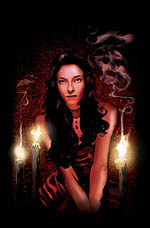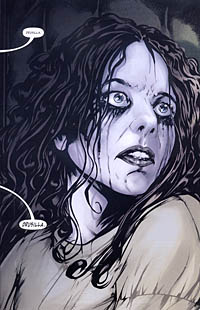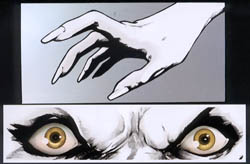 Written by Juliet Landau and Brian Lynch
Written by Juliet Landau and Brian Lynch
Art by Franco Urru
32 pages, color
Published by IDW
The last time I looked at IDW’s Angel series, it had just wrapped up the long-running "After the Fall" story (detailing what happened after the show’s conclusion), and seemed to be trying to find a new direction. To that extent, Angel seems to be working on the latter, opening with a story that takes place before "After the Fall" and focusing on a popular supporting cast character, Drusilla. Honestly, though, I was a little surprised to not see a huge "written by Juliet Landau!" (the actress who played Drusilla) byline across the cover. It’s definitely the greatest selling point of this comic.
 Drusilla’s had better days. Found by the LAPD with numerous wounds, she was eventually brought to a mental institution where she’s been in solitary confinement. Unfortunately for the staff and other patients of the institution, though, one of the doctors thinks it would help Drusilla by moving her into a new ward. And if you’ve ever encountered Drusilla before, you’ll know that the last thing you want is for her to have any freedom whatsoever.
Drusilla’s had better days. Found by the LAPD with numerous wounds, she was eventually brought to a mental institution where she’s been in solitary confinement. Unfortunately for the staff and other patients of the institution, though, one of the doctors thinks it would help Drusilla by moving her into a new ward. And if you’ve ever encountered Drusilla before, you’ll know that the last thing you want is for her to have any freedom whatsoever.
As a basic story, Angel #24 isn’t bad. Landau (and co-scripter Lynch) has a good idea in sticking Drusilla in a mental institution, since the one thing we’ve definitely seen over the years on both Buffy the Vampire Slayer and Angel is that she’s completely crazy. The problem, of course, is that the doctors and staff of the institution have no idea that Drusilla’s telling the truth, which means that they’re all huddled around a powder keg that sooner or later will explode. Lynch and Landau certainly have a good grasp of bringing Drusilla’s voice to the printed page; I give them full credit for making the character "sound" like her television counterpart, something that isn’t always easy.
On the down side, though, the story itself feels slightly padded and lethargic. The comic moves far too slowly, and it’s hard to not walk away with the impression that this two-issue story was really only about one-and-a-half issues worth of material. Part of the slowness is achieved thanks to most of the characters in Angel #24 acting remarkably stupid. It’s hard to believe that the doctors in the institution would really turn a blind eye to the body count that quickly begins to rack up once Drusilla leaves solitary confinement, and that lack of believability makes the foundation of this story begin to crumble. It could be that next issue’s conclusion will feature a twist that explains why this behavior occurs, but on its own it’s annoying.
 I do quite like Franco Urru’s art in this issue of Angel. Its airy, almost ethereal nature is a perfect fit for a story starring Drusilla. One moment it seems soft and gentle, the next minute it’s violent and dangerous. I like that he’s been getting stronger with his storytelling since the debut of Angel two years ago; he’s got a much better sense of action and movement on his pages now, and his usage of facial expressions are probably the best thing about the book. From fear to hunger to confusion, Urru brings Landau and Lynch’s script to life by providing additional information to the reader without having to resort to clunky narration boxes. It’s nice to see an artist so in touch with the script’s needs.
I do quite like Franco Urru’s art in this issue of Angel. Its airy, almost ethereal nature is a perfect fit for a story starring Drusilla. One moment it seems soft and gentle, the next minute it’s violent and dangerous. I like that he’s been getting stronger with his storytelling since the debut of Angel two years ago; he’s got a much better sense of action and movement on his pages now, and his usage of facial expressions are probably the best thing about the book. From fear to hunger to confusion, Urru brings Landau and Lynch’s script to life by providing additional information to the reader without having to resort to clunky narration boxes. It’s nice to see an artist so in touch with the script’s needs.
Angel has a new creative team scheduled to take over in a few months, but until then, having Landau, Lynch, and Urru in for two months is an improvement. The pace needs to be a little faster—there just doesn’t seem to be that much meat to this story—but for an actor-driven story for a sideline, it’s definitely better than most attempts along this line. It’s certainly an improvement from where Angel was earlier this year, and that’s something to be thankful for.
